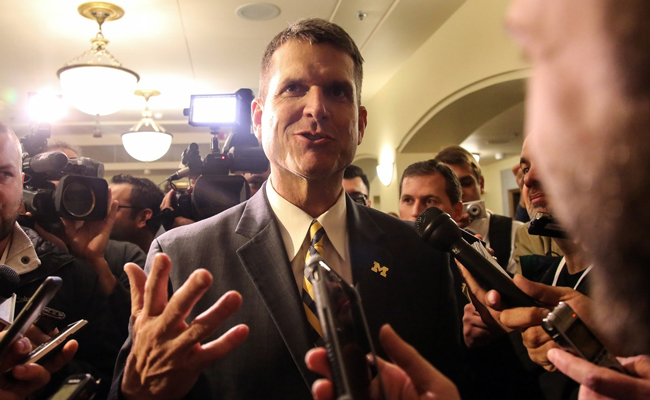
Critics of oversigning and greyshirting in recruiting often are misplaced
This recruiting cycle, Michigan head coach Jim Harbaugh and his staff had to cut ties with a couple of long-time commits late in the process. Alabama and head coach Nick Saban discussed a greyshirt option with a long-time commit. At several other programs, prospects who were committed ended up being encouraged to look elsewhere and ultimately did.
All of this brought the ethical question of “oversigning” to the forefront of the college football narrative yet again.
The take here on this subject is this — it is much more of a case-by-case situation than an issue that plagues the institution of college football as some make it out to be.
It is often portrayed in the media, regardless of the circumstances, as a big, bad evil emperor casting a potential subject out of the empire with no good reason and the poor, hopeful serf must then go and find another land to plow, dreams crushed and hopes shattered.
That can be applicable in certain cases where a school just straight-up drops a prospect. But it’s far more often that coaches give ample warning and it’s more of a case of misunderstanding on the part of the prospect, parents, his coaches and the folks around him than it is any sort of diabolical plan.
And very often, because of NCAA rules that prohibit coaches from talking about recruitable athletes in the media, there can be no response to a one-sided story that gets released — as was the case with Downers Grove, Ill., offensive tackle Erik Swenson (signed with Oklahoma) and Michigan this past recruiting cycle.
So the bottom line is this subject is more applicable to each individual prospect and their respective institutions than to some broad critical narrative of major college football and the coaches that run those programs.
The negative feelings about greyshirting also are blown way out of proportion. The bottom line is that an opportunity still exists for a prospect to be part of the football program that he allegedly wants to be a part of — it’s just delayed.
This country, of which college football is an important part of the cultural fabric, is all about opportunity. Greyshirting is more of a logistical issue than that taking of an opportunity. As we all know, in any sort of situation, the logistics can change. If I want to work at a certain company and it’s a dream of mine to work there, but they can’t put me on the payroll for six months, it’s my decision to either wait it out or seek employment elsewhere. The company is not to blame and certainly isn’t robbing me of the opportunity.
Again, it isn’t as if there is never a situation where a program has to ask itself if it acted in an ethical manner regarding a topic such as this one, but the bottom line is that it doesn’t happen in an unethical manner as much as it is portrayed.
With everything else that needs examining about the recruiting process in college football, subjects such as these are nothing more than overblown “white-knighting” from many who fancy themselves as “reformers” of the sport and with little or no attention or fact-digging or attempt to get both sides in the individual cases, one has to question if it is fair to paint with such a broad brush.
